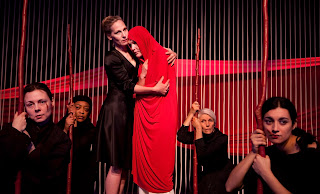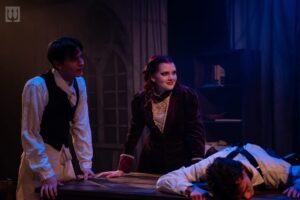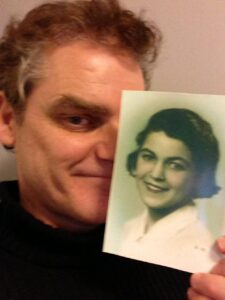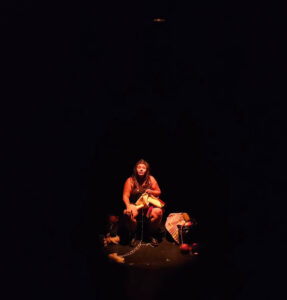shannon perrault, karen robinson, philippa domville,
tara rosling, barbara gordon, daniela lama
photo by cylla von tiedemann
It is a haunting image, the one of a woman with her tongue cut out, and it is an image that is powerfully evocative of millions of women who have been silenced across time and whose stories have been lost to history forever. In Erin Shield’s new play If We Were Birds, playing until May 23rd, 2010 in the Tarragon Theatre Mainspace in association with Groundwater Productions one woman, her mouth pouring blood, has had her tongue sewn back in, symbolic of our ability to use art to give women back their voices and to heed their tales of horror and tragedy.
This woman is Philomela, the Princess of Athens from Greek Mythology referenced in Ovid’s Metamorphosis, and Shields’ play is a vivid retelling of this myth. Ancient Greek tragedies have a penchant for bloodiness but I find that they are also typically alienating because the playwrights center them on the seriousness and dignity of one great person whose experience does not mirror that of its intended audience. At the same time, because of the Greek’s belief that violence should not be shown onstage, the practice of having a messenger relating the violent acts that have passed has the potential to distance the audience from the action of the play. Conversely in If We Were Birds, Erin Shields freely adapts this myth and roots it deeply in the entrails of humanity using poetic language to suggest the story’s past but connecting it effectively to the violence committed against woman in war across the ages.
The play begins with Philomela and her older sister Procne, two young girls in the throes of adolescence curious about their changing bodies and their new interest in knowing about the bodies of men. The girls have a fierce sisterly bond, but they are torn apart when their father, King Pandion, gives Procne’s hand in marriage to King Tereus of Thrace as a reward for helping Athens in war. Procne grows to love the warrior Tereus and together they have a son, Itys. Homesick for her sister, Procne begs her husband to bring Philomela for a short visit, but when he sees how much his young sister in law has grown since his marriage he begins to lust after her, rapes her, cuts out her tongue and leaves her in a cabin to die. Instead, Philomela weaves a tapestry telling her story, which finds its way to Procne and culminates with the two sisters, wild in their hunger for revenge, brutally slaying the child Itys and feeding him to his father. It is not a story for the faint of heart, but one that still resonates with brutal relevance.
Erin Shields’ most powerful addition is a chorus of slave women who tell stories about their own rapes and the horrific brutally they have seen at the hands of soldiers spanning generations and crossing the globe from NanKing (1937), Berlin (1945), Bangladesh (1971), Bosnia-Herzegovina (1992-1995) and Rwanda (1994). Their monologues eloquently tie Philomela’s suffering to the ongoing victimization of women in the midst of war. They enter Philomela’s home as the bounty of war and she is initially sceptical of their accusations toward the soldiers and the claims that they were once ordinary, happy daughters, mothers and wives. She feels superiority toward them and asserts that they must have done something to provoke such a gruesome fate, but as she and Procne come to realize, war is so often an excuse for boorish men to inflict as much violence as they want to whomever they please, without consequence or conscience.
The performances in this play are incredible, as they need to be to convey such intense subject matter with the dignity that these stories deserve. I saw David Fox last as Donald Rumsfeld in Stuff Happens (Studio 180 Theatre) and he plays King Pandion with the similar distinct air of an American businessman leading a war from afar, which makes a logical connection between the Empires of Athens and the United States. Philippa Domville makes a poignant Procne, with boundless love for her sister and an immediate genuine fear of marriage which suggests how young and underdeveloped she is emotionally and sexually at the beginning of the play. She showers her aggressive husband with all the warmth he does not deserve and then lashes out with unbridled rage upon seeing the unthinkable pain he has inflicted on her sister. Geoffrey Pounsett elicits little pity as the belligerent Tereus who stomps around the stage filled with inflated ego and a sharp sense of entitlement to everything he sees. Tara Rosling is the shining star as Philomena, who is initially filled with a feisty sense of fun, a shrewd and clever amicability and a delightful relationship with both her sister and her father. After Tereus rapes her, Philomela does not retreat like a victim; she reproaches him hatefully and forces him to consider the consequence of his violent lust. She says, “Look at the mess you made of me… Shame on you. I am ruined.” Tereus becomes wild with having his monstrosity reflected back at him and tells her repeatedly to shut up and finally cuts her tongue out of her mouth not only to silence her, but in attempt to silence the haunting cries of the crime he has committed.
Alan Dilworth directs this play with magnificently strong choices. Perhaps the most gripping moment for me was the rape of Philomela, in which Pounsett and Rosling are placed in figurative positions, but Tereus pounds the young girl with a steady acceleration of words, a justification for why his blood compels him to do this to her, that he cannot control his lust and therefore he is not responsible for his actions. The words are disjointed, poetic and capture the arc of a cruel orgasm. Dilworth also chooses to show Procne’s bloody murder of her only child onstage, but the baby itself is not represented literally, which allows the audience to consider Procne’s justification that she is freeing this child from his inevitable legacy of war and the cruelty he will doubtlessly grow to inflict on others, rather than focusing on the depiction of the mutilation of a child onstage.
In the end, the Olympian Gods change all the characters into birds where they are able to fly away from their earthly circumstances, but are still doomed to see and to relive the past from above. In the same way, Erin Shields play If We Were Birds reminds us that the cycle of violence and brutally against woman is not something reserved for the Greeks. We have not broken free from the shackles of the past just yet, we can fly away but we must not forget or be silenced.
If We Were Birds in association with Groundwater Productions plays at the Tarragon Theatre Mainspace (30 Bridgman Avenue) until May 23rd, 2010. For more information or to book your tickets please visit http://www.tarragontheatre.com or call the box office at 416.531.1827.







